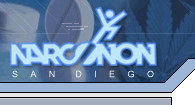

| 1-800-871-4350 |
 |
 |
 |
 |
 |
 |
 |
 |
 |
 |
| NARCONON FACTS |
|
Narconon graduates are brought back to life, confident, in control and able to achieve their goals without the use of drugs.
Intervention is a process that helps an addict recognize the extent of his problem. A Narconon graduate is not left with the urge to relapse, nor does he need to be put on other medications to make him stable. Narconon graduates are brought back to life: confident, in control and able to achieve their goals without the use of drugs. An important aspect of the Narconon program is the systematic application of techniques to improve communication and interpersonal skills in persons dependent on alcohol and/or drugs. |
| RESOURCES |
 |
Narconon Educational Programs
In
the development of an effective prevention program, Narconon staff first addressed
where drug education efforts have failed in the past. The basic method used formerly
in drug education has been the "scare tactic" approach. This was an attempt to
scare youth away from drugs. It never worked; and in many cases perpetuated drug
use by presenting information that was easily discredited.
In the Narconon drug education presentations to schools, we have refined an approach that speaks powerfully to kids in their own language.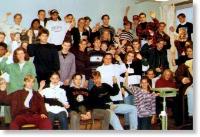 Our professionals, many
of whom are former addicts, speak from their own experiences with drugs and give
a realistic picture of drug use. We don't just tell kids to "say no"; we educate
them to come to that conclusion on their own,
Our professionals, many
of whom are former addicts, speak from their own experiences with drugs and give
a realistic picture of drug use. We don't just tell kids to "say no"; we educate
them to come to that conclusion on their own,
and more importantly, show them how to say no and what exactly they are saying no to.
Our study of questionnaires filled out by students has shown us the precise information that causes kids to:
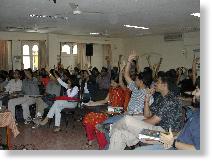
We also explore the problems that often underlie drug use. With teenagers, the casual factor can often be boredom or an inability to communicate with others. Therefore, other subjects such as setting and achieving goals are covered as a method to avoid falling into the trap of substance abuse. We clearly distinguish the feeling of "getting high" from drug use which is temporary and damaging from the feeling of self-confidence and true happiness through productivity and accomplishments, which is permanent and real.
The Narconon presentations are divided into several subjects. They are geared to the appropriate age groups and focus on the real life situations that often lead to drug use.
In the Narconon drug education presentations to schools, we have refined an approach that speaks powerfully to kids in their own language.
 Our professionals, many
of whom are former addicts, speak from their own experiences with drugs and give
a realistic picture of drug use. We don't just tell kids to "say no"; we educate
them to come to that conclusion on their own,
Our professionals, many
of whom are former addicts, speak from their own experiences with drugs and give
a realistic picture of drug use. We don't just tell kids to "say no"; we educate
them to come to that conclusion on their own, and more importantly, show them how to say no and what exactly they are saying no to.
Our study of questionnaires filled out by students has shown us the precise information that causes kids to:
- Decide to stop using drugs (for those who already used them).
- Change their mind from possibly trying or using drugs to a firm decision not to use them.
- Believe more firmly in their decision not to use drugs (when they state they are already against them).

We also explore the problems that often underlie drug use. With teenagers, the casual factor can often be boredom or an inability to communicate with others. Therefore, other subjects such as setting and achieving goals are covered as a method to avoid falling into the trap of substance abuse. We clearly distinguish the feeling of "getting high" from drug use which is temporary and damaging from the feeling of self-confidence and true happiness through productivity and accomplishments, which is permanent and real.
The Narconon presentations are divided into several subjects. They are geared to the appropriate age groups and focus on the real life situations that often lead to drug use.
- The physical effects of drugs on the body
- How drugs affect the mind
- Marijuana-The myth
- The Truth About Ecstasy
- The Truth About Methamphetamines
- Drugs and Alcohol; how the media affects young people
- Tobacco, smoking and your health
- LSD-One of today's most dangerous drugs
- Establishing and achieving goals in life-how this eliminates the desire for drugs
- Peer pressure and resisting drug use
- Addiction-how it starts and what keeps a person addicted
- How emotions play a role in drug use
Narconon Peer Leading Training
Peer
leaders are a tremendous resource, and with the proper training are very effective
in educating their peers on substance abuse and other subjects.
The Narconon Peer Leader Training was developed as a result of many years experience in the field of drug prevention and the education of young people on alcohol and other drugs.
The Narconon Peer Leader Training was developed as a result of many years experience in the field of drug prevention and the education of young people on alcohol and other drugs.
Students
are provided with the skills necessary to become competent leaders amongst their
peers and take an active role in combatting substance
abuse. This includes setting a good example for elementary school children and
showing these young people that life is better without drugs. The above is accomplished
through a series of exercises and lessons in communication and listening skills,
interpersonal relationships and how to relay information on alcohol and other
drugs.
The key element of the program
is communication skills. The students participate in training exercises that increase
their ability to focus attention, confront issues they might otherwise shy away
from, develop listening skills, relay a communication effectively and most importantly,
raise their confidence level.
These simple, yet extremely effective, exercises
require the participants to demonstrate their competence in the relay of information
to their peers.
The second segment includes learning skills which cover
how to work with people of different age and literacy levels and how to overcome
the barriers to communicating information to them.
Each program is specifically
designed to the needs of the group, taking into consideration their purpose, goals
and activities. Emphasis is placed on creating a more workable group that will
remain active in the school and community. The above skills are then applied to
the specific theme of the program. Some of the specialized programs available
are:
- Leadership skills and positive role models
- Conducting effective community projects
- Alcohol and other drug education
- Violence prevention
- Public speaking
- Peer Counseling
Educator Training Workshops
Narconon
also provides training workshops for educators. These workshops are designed to
impart the key methods and tools used in the Narconon program,
that educators can utilize in the classroom with their students.
Narconon Results of Our Program
Following our presentations, each student is given a questionnaire to help us evaluate the effectiveness of the program. These surveys provide vital information that is used to enhance, update and increase the effectiveness of our presentations.
Our
success in reaching students is measured by the question, "Did your thoughts
about using drugs change after hearing our presentation?" To date, we have
received an overall 95% positive response to the program. 40% reported an increased
perception of risk. 45% said their decision not to use drugs had been reinforced
after hearing the talk. Over 90% felt they knew more about drugs after the talk.
An independent study of the Narconon Drug Education program conducted
by FASE (Foundation for Advancements in Science and Education) in Los Angeles
concluded: "Changes in those who had indicated that they might use drugs
were quite pronounced. Responses clearly indicated a heightened awareness of the
adverse effects caused by drug abuse. Comments indicating that they would now
never use drugs were common."
What Kids Say....
The Narconon program changes kids minds about using drugs. The simplest demonstration of the success of the Narconon program is to hear it from the students themselves. The following are just a few responses following a Narconon presentation:
"Yes, They did cause I thought about trying pot out of curiosity but, now I'm afraid cause of how it will harm you. There's no point."
"I thought it was good that he told us the story about LSD because I thought it was a safe drug. I also learned how harmful weed was I thought that was harmless".
"My thoughts about drugs had changed. I used to think drugs were cool. I thought since everybody does it I should do it too. Now I realize that drugs are bad."
What Educators Say...
"I, personally, was very moved by the presentation. I also learned new information along with our students. I believe, after hearing the presentation myself, that this program can truly save lives as well as help people make decisions that will lead them towards productive lives." - School Principal
"Often children are misinformed about the painful effects of alcohol and drug use or abuse. The Narconon presenter was able to clear up the myths and misunderstandings about substance use and abuse. In addition to his charismatic teaching approach, his willingness to share his own struggle with substance abuse encouraged our students to actively listen and learn from his presentation." - School Counselor
Nearly 25 years ago, the Narconon organization pioneered promoting the positive image of drug-free living through public events featuring prominent spokespersons and celebrities. American actress Kirstie Alley, one of the international spokespersons for the Narconon organization, has tirelessly promoted drug-free living at public events and in radio, television and press interviews. U.S. sports legend Willie Gault has MC'd fundraisers and Hollywood film luminary John Travolta has long been a member of the Narconon International Advisory Board.

John
Travolta, Kelly Preston and Anne Archer
at a John Travolta movie benefit screening
The Narconon organization also sponsors high-profile public events, such as celebrity "Narconon All Stars" sports contests in Hollywood, Native American ceremonial dances in Oklahoma, rock concerts in Italy and sporting games with police organizations in Germany, Switzerland and many other countries. All of these activities forward the message that celebrities and responsible citizen groups are opposed to drugs.
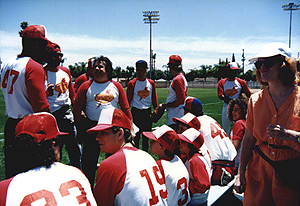
| Quote |
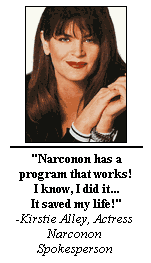
 |
| Link
to Us! |
Show your support, link to us! |
 Funding pledged to fight drug abuse
Funding pledged to fight drug abuse


